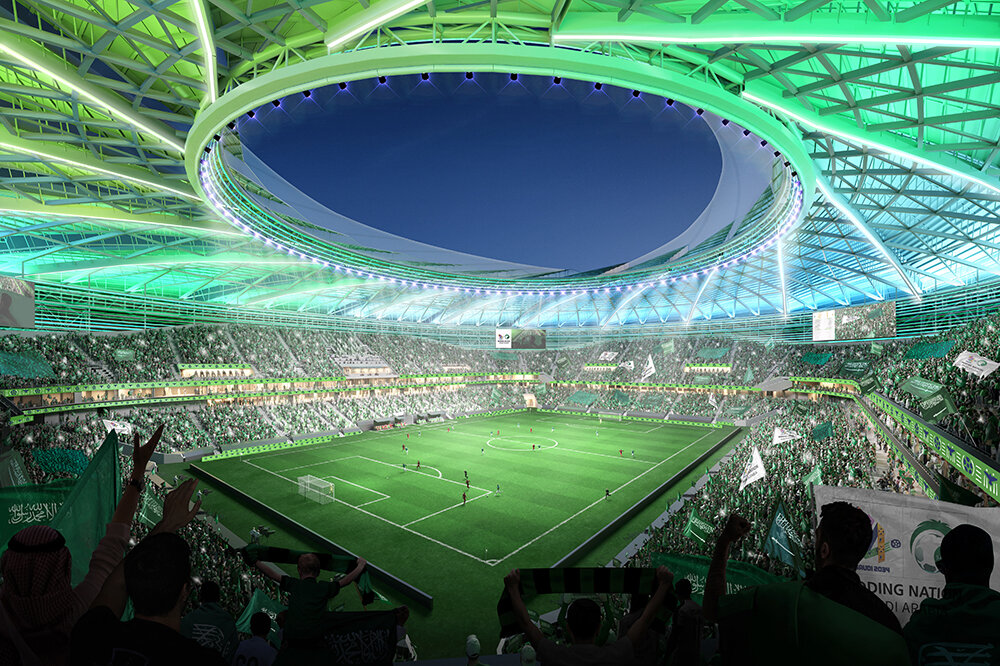
The World Cup is poised to bring in substantial infrastructure investments, enhance tourism, and further elevate Saudi Arabia's global profile. The government has committed billions of dollars to upgrade its infrastructure, ranging from the construction of new stadiums to the expansion of transportation networks. These efforts are expected to generate a ripple effect, benefiting various sectors, including construction, hospitality, and retail, while also positioning the country as a prime destination for international businesses.
Analysts believe that the World Cup will accelerate the realization of Vision 2030, the ambitious plan set forth by Crown Prince Mohammed bin Salman to diversify the kingdom’s economy away from its reliance on oil. A large-scale event like the World Cup offers the perfect opportunity to showcase Saudi Arabia's rapid transformation, positioning it as a hub for global investment. As part of the strategy, the kingdom is looking to attract both public and private sector capital, aiming to create long-term sustainable economic growth.
The stock market's reaction has already been positive, with the Tadawul All Share Index (TASI), Saudi Arabia’s benchmark stock market index, seeing an uptick in recent weeks. Key sectors, especially construction and hospitality, have drawn significant investor interest. The promise of multi-billion-dollar infrastructure projects, including stadiums and hotel developments, has fueled investor optimism. Major construction companies have already been witnessing an increase in their stock prices, signaling a boost in confidence from the market.
One of the most notable beneficiaries of this economic surge is the hospitality industry. With the influx of tourists and international visitors during the World Cup, Saudi Arabia is positioning itself to capitalize on the tourism boom. The country has been actively working on transforming its tourism infrastructure, including expanding luxury hotels, improving transportation networks, and creating new leisure facilities. The hospitality sector is expected to see a massive increase in demand, and publicly listed companies in this space are preparing for growth.
Tourism is not just an immediate boon. Saudi Arabia aims to diversify its economy and develop long-term sustainable tourism, with the World Cup serving as a stepping stone to this goal. According to industry experts, hosting the event will enable Saudi Arabia to not only attract global visitors for the tournament but also build long-term relationships in the hospitality and tourism sectors.
The increased foreign investment generated by hosting the World Cup could also have a broader effect on Saudi Arabia’s financial markets. For instance, global institutional investors may be drawn to Saudi companies that are expected to benefit from the World Cup’s related projects. This may also open doors for foreign direct investment (FDI), as global companies look to establish a foothold in the kingdom ahead of the tournament. As part of Vision 2030, Saudi Arabia has made strides in improving its ease of doing business and offering attractive incentives for foreign investors.
A crucial area of focus is the retail sector. With millions of fans expected to attend the World Cup, coupled with the growing middle class in Saudi Arabia, the retail sector is anticipated to see a significant uptick in demand. From merchandise sales to hospitality services, the event will offer businesses new opportunities to expand and cater to both local and international consumers. Retail stocks, particularly those involved in consumer goods, could see considerable growth.
Energy and technology companies are also likely to benefit from the World Cup’s preparations. The event will push for advancements in energy infrastructure, including renewable energy projects, and enhance the country’s focus on smart city technologies. As Saudi Arabia strives to diversify its economy, the technology and renewable energy sectors are set to play an integral role. The World Cup is expected to accelerate the kingdom's transition into a modern, high-tech economy, which will be reflected in stock market performance in these sectors.
The event is likely to bolster the country's sovereign wealth fund, the Public Investment Fund (PIF), which has already been making strategic investments in global markets. The World Cup’s potential to attract foreign capital could provide further opportunities for the PIF to strengthen its portfolio and make investments that align with Saudi Arabia's long-term economic goals.
There is also an expectation that the event will accelerate social and cultural reforms within the country. The World Cup is seen as an opportunity for Saudi Arabia to project a new image globally—one that highlights its evolving social fabric and the modernization efforts being undertaken. By hosting an international sports spectacle, the country is signaling its readiness to embrace more openness to the world while staying true to its unique cultural identity.
However, the economic benefits come with challenges. Despite the projected growth, the country must overcome hurdles such as managing the vast logistics of hosting such a large-scale event and ensuring a smooth transition from short-term opportunities to sustainable long-term development. It remains to be seen whether the anticipated economic boom will reach all sectors of the economy or whether it will be concentrated in select areas.
There is an inherent risk in over-relying on mega-events like the World Cup to drive economic growth. While the short-term gains are promising, the country will need to maintain momentum in its broader economic transformation beyond the World Cup to ensure long-term success. For the stock market, this means that investors must be cautious of the cyclical nature of such events and focus on the broader vision for Saudi Arabia’s economic diversification.
Topics
Spotlight
